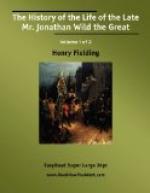That Jonathan Wild is for the most part a magnificent example of sustained irony, one of the best in our literature, critics have generally agreed. The comparison steadfastly insisted upon between Jonathan Wild’s greatness and the greatness which the world looks up to, but which without being called criminal is yet devoid of humanity, is admirable. Admirable, too, is the ironical humour, in which Fielding so excelled, and which in Jonathan Wild he seldom drops. It would take too long to mention all the particularly good ironical passages, but among them are the conversation between Wild and Count La Ruse, and the description of Miss Tishy Snap in the first book; the adventures of Wild in the boat at the end of the second book; and, in the last, the dialogue between the ordinary of Newgate and the hero, the death of Wild, and the chapter which sets forth his character and his maxims for attaining greatness. And yet as a satire Jonathan Wild is not perfect. Fielding himself hits upon its one fault, when, in the last book, after the long narrative of Mrs. Heartfree’s adventures by sea and by land, he says, “we have already perhaps detained our reader too long ... from the consideration of our hero.” He has detained us far too long. A story containing so much irony as Jonathan Wild should be an undeviating satire like A Tale of a Tub. The introduction of characters like the Heartfrees, who are meant to enlist a reader’s sympathy, spoils the unity. True, the way they appear at first is all very well. Heartfree is “a silly fellow,” possessed of several great weaknesses of mind, being “good-natured, friendly, and generous to a great excess,” and devoted to the “silly woman,” his wife. But later Fielding becomes so much interested in the pair that he drops his ironical tone. Unfortunately, however, in depicting them, he has not met with his usual success in depicting amiable characters. The exemplary couple, together with their children and Friendly, are much less real than the villain and his fellows. And so the importance of the Heartfrees in Jonathan Wild seems to me a double blemish. A satire is not truth, and yet in Mr. and Mrs. Heartfree Fielding has tried—though not with success—to give us virtuous characters who are truly human. The consequence is that Jonathan Wild just fails of being a consistently brilliant satire.




